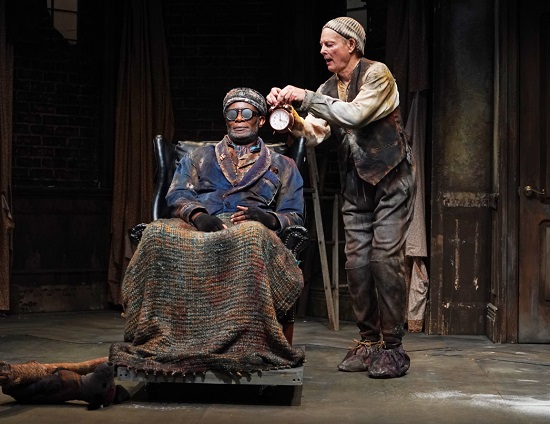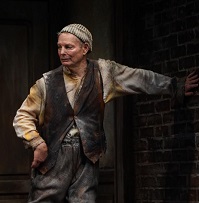ENDGAME

Tickets from $45 Buy Tickets

Cititour.com Review
Even if New York has had one of its mildest winters, many theatergoers might still want to opt for a sunnier experience than Samuel Beckett’s 1957 masterwork “Endgame,” a 90-minute meditation on the futility of existence, set inside a bleak, nearly windowless room. As the play’s main characters, Hamm and his servant Clov, blather on while waiting for the “endgame” – essentially, death – no one would blame you for trying to exit early and head to the nearby Harry Potter store for a Butterbeer. (Don’t do it!)
Indeed, despite its less-than-cheery subject matter, the Irish Repertory Theater’s latest revival of this admittedly difficult and sometimes unfathomable play, keenly directed by Ciaran O’Reilly, is worth seeing for the opportunity to witness two of our finest actors, John Douglas Thompson and Bill Irwin, hand in unforgettable performances in exceedingly difficult roles.
As Hamm, the blind, paralyzed elderly owner of the dwelling, Thompson is brilliantly mercurial. He is cruel and even sadistic one moment, then slightly gentle or even jovial, then desperately needy, calling for his toy dog (who, seconds later, gets unceremoniously thrown to the floor), often switching moods without the slightest warning.
Yet, even as he hurls words like “fornicator” at his seemingly kind father Negg (Joe Grifasi) or shows blatant disregard for his mother Nell (Patrice Johnson Chevannes, making the most of a role that is essentially a glorified cameo) -- both of whom live entrapped in garbage cans – Thompson’s Hamm often feels more like an unhappy child acting out instead of some malevolent dictator.
Further, with his booming voice and precise diction, Thompson often makes Beckett sound like Shakespeare. And in some ways, one can’t but think that Thompson is using this role to prepare for eventually taking on the title role in “King Lear.” (He appeared in the play’s problematic Broadway production opposite Glenda Jackson.) That comparison also comes quickly to mind as Clov bears a spiritual resemblance to Lear’s Fool.
As good as Thompson is, the show belongs to Irwin, who has long been one of Beckett’s foremost interpreters. A magnificent physical performer, Irwin shuffles around as if his legs really don’t work; each time (and there are many) when he is forced to climb a ladder to open up the room’s windows (which barely have a view), one worries for Irwin’s safety in getting to the top or coming down. Irwin doesn’t play these moments for laughs, even if they do elicit an occasional chuckle.
More importantly, Irwin precisely captures the codependent relationship that he’s formed with Hamm (who seemingly has raised Clov since he was an infant). Unsurprisingly, as in many “father-son” dynamics, there are flashes of affection offset by flashes of anger that can pierce our hearts. In Irwin’s mouth, words can wound even more strongly than anything Clov could do with his shaky hands.
Further, Clov’s repeated threats to leave Hamm feel both empty and possible, although we’re meant to believe that the world outside the dwelling is even more unsafe than the world he inhabits, complete with crawling rats and fleas that jump onto his body. There is another way out for both men, but neither one can bring himself to commit either murder or suicide, no matter how strong the temptation.
As Beckett well knew, death ultimately waits for no one. As we know, Butterbeer, to its credit, waits for the show to end.
By Brian Scott Lipton
Visit the Site
https://irishrep.org/
Open/Close Dates
Opening 2/2/2023
Closing 4/16/2023
Theatre Info
Irish Repetory Theatre
132 West 22nd St.
New York, NY 10011
Map
Comments


 Sign up for our newsletter !
Sign up for our newsletter !